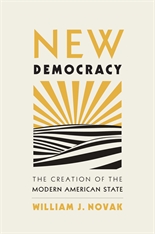The Book
New Democracy: The Creation of the Modern American State
The Author(s)
William J. Novak

William Novak has written a rich, complicated book examining the origins of the modern American state, challenging conventional “myths,” as he refers to them, of our understanding of the legal system and administrative law. He argues that the conventional approach is to view the nineteenth century as a period of laissez faire government. The Progressive Era saw some administrative innovations in response to industrialization and big business, but it was not until the New Deal that Americans saw the birth of the modern administrative state. According to Novak, the administrative state is often interpreted as creating anti-democratic technocratic bureaucracies that ultimately fall prey to regulatory capture. Novak’s central argument is that the power of the laissez-faire myth “render invisible” the radical administrative innovations on the local, state, and national level.[1] In his interpretation, Americans embraced regulatory and administrative law to advance the cause of democracy rather than limit freedom.
Novak argues that, Contrary to the myth of laissez-faire, if one considers the totality of governments, from the local to the national levels, the United States has a long and robust tradition of governmental administration and regulation. As Novak writes, in the decades after the Civil War the “Nineteenth-century traditions of local self-government and associative citizenship were replaced by a modern approach to positive statecraft, social legislation, economic regulations, and public administration.”[2] Novak argues this period represented not just a reform movement, but also an “unambiguous emergence of a new regime of American governance – a modern democratic state.”[3] Americans turned to administration and regulation to expand democracy, checking the undemocratic power of big business that had captured legislatures.
Novak argues that the rise of the reform movements that gave the government administrative powers strengthened democracy as they undergirded a belief in the commonwealth and the importance of representation. Similar to what scholars like Eric Foner have argued, the Civil War and Reconstruction represented a flawed rebirth of American democracy, a different understanding of the nation. Intellectuals, legal scholars, and policy makers created a “new democracy” that broke with antebellum visions of government and citizenship. As Novak writes regarding citizenship, “modern American history begins with the abolition of the slaveholder’s constitution.”[4]
Novak’s focus is on administration and legal thinking through the topics of citizenship, police power, public utilities, social legislation, antimonopoly, and administration. Given our recent pandemic, his discussion of the police power as the “power of the state to regulate in the interest of public health, safety, and welfare” is particularly interesting.[5] Novak challenges the conventional narrative the American government was limited in scope and scale until the Great Depression and the New Deal. In previous works, particularly The People’s Welfare: Law and Regulation in Nineteenth Century America, Novak challenged the myth of the “weak” American state. He concludes with a provocative discussion of the myth of the New Deal as the origin point for the modern American state.
New Democracy points to the messiness of chronological periods in American history. While we often divide our classes into familiar periods or themes, his work advances the idea that often these periods are not so neat. As such, Novak’s work contributes to works on a longer progressive period such as Jackson Lear’s Rebirth of a Nation: The Making of Modern America, 1877 – 1920. Novak also demonstrates how central legal thinking was to America’s response to the changes that followed the Civil War. Much of the book reads like an intellectual history of legal, economic, and social thinkers. In these cases, Novak makes a convincing argument. Novak does not spend much time on major national leaders, such as Teddy Roosevelt’s New Nationalism or Herbert Hoover’s Associational State, which would fit well into his overall argument. Novak’s argument is one that has, and will continue, to spark debate as it goes to the heart of one of oldest questions in American political life.
[1] William J. Novak, New Democracy: The Creation of the Modern American State (Cambridge: Harvard University Press, 2022), 5.
[2] Novak, New Democracy, 1.
[3] Ibid.
[4] Novak, New Democracy, 25.
[5] Novak, New Democracy, 69.
About the Reviewer
Phillip Payne is a professor of history at St. Bonaventure University where he teaches courses in United States History, public history, and digital history. He is the author of Dead Last: The Public Memory of Warren G. Harding’s Scandalous Legacy (2009) and Crash! How the Economic Boom and Bust of the 1920s Worked (2015). He has published articles and essays on popular culture and teaching with games. He was recently part of a team awarded an NEH grant to explore methods to link education and history classes through digital spaces, inquiry-based learning, and place-based projects with community partners. More on him can be found at https://www.historyprofessorpayne.com/

0